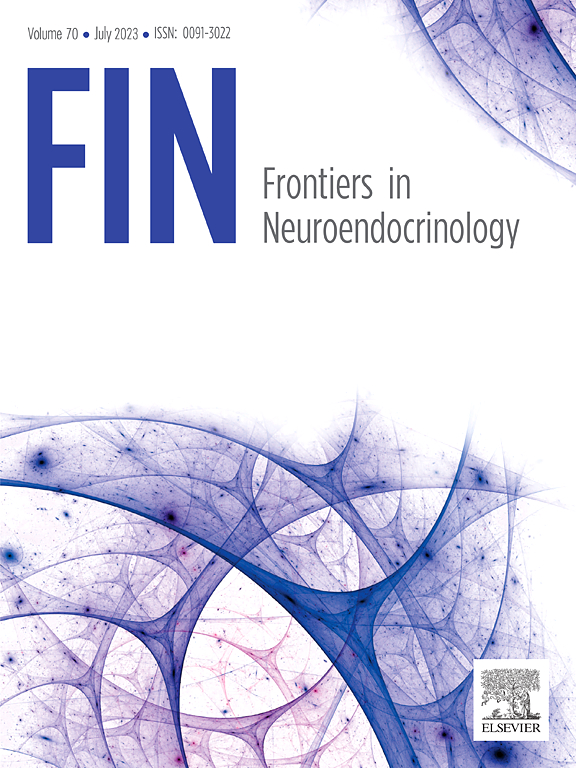胰岛素样生长因子-1 与认知健康:探索细胞、临床前和临床层面。
IF 6.7
1区 医学
Q1 ENDOCRINOLOGY & METABOLISM
引用次数: 0
摘要
年龄和胰岛素样生长因子-1(IGF-1)与认知能力下降和痴呆症呈反向关系。众所周知,IGF-1 具有重要的多效应功能,从神经发育期开始,一直延伸到成年期,如神经发生。在细胞水平上,IGF-1 通过神经元和神经胶质细胞上的 IGF-1 受体具有多向信号机制,可减轻炎症反应、促进髓鞘化、维持星形胶质细胞功能的平衡和神经元突触生成。在衰老的临床前啮齿动物模型和 IGF-1 的转基因模型中,IGF-1 的增加能改善各种行为范式的认知能力,而通过基因敲除模型减少 IGF-1 则能诱发认知障碍。在临床层面,大多数研究都强调 IGF-1 水平的提高与认知能力的改善有关。本综述从细胞信号水平、临床前和临床水平对 IGF-1 与认知之间的关系进行了全面的最新评估。本文章由计算机程序翻译,如有差异,请以英文原文为准。
Insulin-like growth factor-1 and cognitive health: Exploring cellular, preclinical, and clinical dimensions
Age and insulin-like growth factor-1 (IGF-1) have an inverse association with cognitive decline and dementia. IGF-1 is known to have important pleiotropic functions beginning in neurodevelopment and extending into adulthood such as neurogenesis. At the cellular level, IGF-1 has pleiotropic signaling mechanisms through the IGF-1 receptor on neurons and neuroglia to attenuate inflammation, promote myelination, maintain astrocytic functions for homeostatic balances, and neuronal synaptogenesis. In preclinical rodent models of aging and transgenic models of IGF-1, increased IGF-1 improves cognition in a variety of behavioral paradigms along with reducing IGF-1 via knockout models being able to induce cognitive impairment. At the clinical levels, most studies highlight that increased levels of IGF-1 are associated with better cognition. This review provides a comprehensive and up-to-date evaluation of the association between IGF-1 and cognition at the cellular signaling levels, preclinical, and clinical levels.
求助全文
通过发布文献求助,成功后即可免费获取论文全文。
去求助
来源期刊

Frontiers in Neuroendocrinology
医学-内分泌学与代谢
CiteScore
13.30
自引率
6.80%
发文量
62
审稿时长
68 days
期刊介绍:
Frontiers in Neuroendocrinology (FIN) publishes a wide range of informative articles including comprehensive reviews, systematic reviews, opinion pieces, and meta-analyses. While the majority of reviews are invited, we also embrace unsolicited reviews and meta-analyses, as well as proposals for thematic special issues, provided they meet our rigorous quality standards. In addition, we encourage authors to submit commentaries that concisely present fresh ideas or offer further analysis to delve deeper into the implications of an article published in our journal.
 求助内容:
求助内容: 应助结果提醒方式:
应助结果提醒方式:


